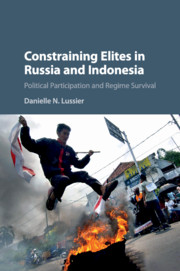24 results
8 - Conclusion
-
- Book:
- Constraining Elites in Russia and Indonesia
- Published online:
- 13 October 2016
- Print publication:
- 13 October 2016, pp 264-278
-
- Chapter
- Export citation
2 - Extending Democratization Theory
-
- Book:
- Constraining Elites in Russia and Indonesia
- Published online:
- 13 October 2016
- Print publication:
- 13 October 2016, pp 40-77
-
- Chapter
- Export citation
1 - Introduction
-
- Book:
- Constraining Elites in Russia and Indonesia
- Published online:
- 13 October 2016
- Print publication:
- 13 October 2016, pp 1-39
-
- Chapter
- Export citation
Contents
-
- Book:
- Constraining Elites in Russia and Indonesia
- Published online:
- 13 October 2016
- Print publication:
- 13 October 2016, pp vii-vii
-
- Chapter
- Export citation
Figures
-
- Book:
- Constraining Elites in Russia and Indonesia
- Published online:
- 13 October 2016
- Print publication:
- 13 October 2016, pp viii-viii
-
- Chapter
- Export citation

Constraining Elites in Russia and Indonesia
- Political Participation and Regime Survival
-
- Published online:
- 13 October 2016
- Print publication:
- 13 October 2016
Tables
-
- Book:
- Constraining Elites in Russia and Indonesia
- Published online:
- 13 October 2016
- Print publication:
- 13 October 2016, pp ix-x
-
- Chapter
- Export citation
Index
-
- Book:
- Constraining Elites in Russia and Indonesia
- Published online:
- 13 October 2016
- Print publication:
- 13 October 2016, pp 295-313
-
- Chapter
- Export citation
Appendix B - Summary of Citizen Samples in Russia and Indonesia
- from 1 - Introduction
-
- Book:
- Constraining Elites in Russia and Indonesia
- Published online:
- 13 October 2016
- Print publication:
- 13 October 2016, pp 35-39
-
- Chapter
- Export citation
Note about Referencing Interview Subjects
-
- Book:
- Constraining Elites in Russia and Indonesia
- Published online:
- 13 October 2016
- Print publication:
- 13 October 2016, pp xv-xvi
-
- Chapter
- Export citation
3 - Elite-Constraining Participation and Democracy’s Survival
-
- Book:
- Constraining Elites in Russia and Indonesia
- Published online:
- 13 October 2016
- Print publication:
- 13 October 2016, pp 78-117
-
- Chapter
- Export citation
5 - Tocqueville Revisited
-
- Book:
- Constraining Elites in Russia and Indonesia
- Published online:
- 13 October 2016
- Print publication:
- 13 October 2016, pp 147-193
-
- Chapter
- Export citation
4 - Testing the Model
-
- Book:
- Constraining Elites in Russia and Indonesia
- Published online:
- 13 October 2016
- Print publication:
- 13 October 2016, pp 118-146
-
- Chapter
- Export citation
References
-
- Book:
- Constraining Elites in Russia and Indonesia
- Published online:
- 13 October 2016
- Print publication:
- 13 October 2016, pp 281-294
-
- Chapter
- Export citation
List of Expert Interview Subjects
-
- Book:
- Constraining Elites in Russia and Indonesia
- Published online:
- 13 October 2016
- Print publication:
- 13 October 2016, pp 279-280
-
- Chapter
- Export citation
Notes on Russian and Indonesian Language
-
- Book:
- Constraining Elites in Russia and Indonesia
- Published online:
- 13 October 2016
- Print publication:
- 13 October 2016, pp xvii-xviii
-
- Chapter
- Export citation
Copyright page
-
- Book:
- Constraining Elites in Russia and Indonesia
- Published online:
- 13 October 2016
- Print publication:
- 13 October 2016, pp iv-iv
-
- Chapter
- Export citation
6 - Political Efficacy and “Throwing the Rascals Out”
-
- Book:
- Constraining Elites in Russia and Indonesia
- Published online:
- 13 October 2016
- Print publication:
- 13 October 2016, pp 194-231
-
- Chapter
- Export citation
Dedication
-
- Book:
- Constraining Elites in Russia and Indonesia
- Published online:
- 13 October 2016
- Print publication:
- 13 October 2016, pp v-vi
-
- Chapter
- Export citation
Acknowledgments
-
- Book:
- Constraining Elites in Russia and Indonesia
- Published online:
- 13 October 2016
- Print publication:
- 13 October 2016, pp xi-xiv
-
- Chapter
- Export citation



